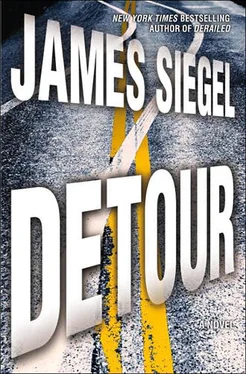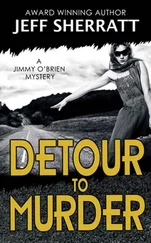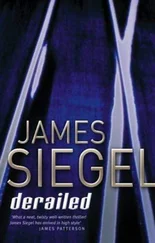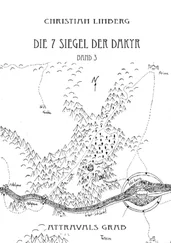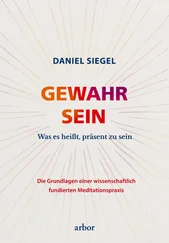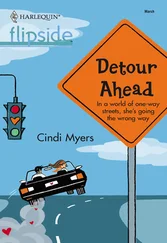Now the legs.
Thin and short and covered in dark blue.
Denim? Or the polyester weave favored by certain government agencies? It was hard to tell. The man’s belt buckle rose into view, something substantial that seemed to serve some greater purpose than merely holding up his pants. The kind of buckle that made a statement.
The shirt began to materialize.
Paul was praying it would be a T-shirt.
Something that said I Love New York .
Or My son-in-law went to Florida but all I got was THIS . Really praying—like back in the first-class lavatory.
It was white and buttoned. There was some kind of badge on it.
A policeman. A customs man.
When Paul entered the last stage of the slowest escalator on earth, he saw he was right and wrong. It was a customs agent, all right, but a woman. She had dyed-blond hair tied into a tight ponytail, ostensibly to keep it from getting into her diligently steely eyes.
It didn’t really matter what sex she was. He was focusing on the dog.
A sniff dog—isn’t that what they called them?
The officer and dog were set up just to the left of the escalator. Paul tried to edge closer to the right railing. The dog was sitting on his hind legs with his quivering black nose pointed straight into the air.
He was wondering. He believed these dogs were capable of sniffing out drugs inside gas tanks, plastic dolls, even concrete canisters. What about people ? Through layers of intestines and fat and condoms and skin?
Seriously sweating skin. Skin that had broken out in a veritable rash of sweat that threatened to turn him into a walking dishrag.
He stepped off the escalator. He could sense the customs woman staring straight at him. He could only sense this, because he was trying not to look at her. He was trying instead to look bored, blasé, nonchalant—to look this way in a direction that wouldn’t bring his gaze in the vicinity of hers.
She must’ve been wondering what might cause a passenger from Colombia to be sweating bullets. No, more like an actual fusillade.
Paul could actually hear the dog sniffing; it sounded like someone with a bad cold. His chest tightened into a single painful knot. There were three supposed warning signs of a heart attack—excessive sweating, chest pain, and numbness—and he currently had all three. Only his numbness was more of the mental variety. He was so scared he couldn’t think.
And then he did a very strange thing.
He petted the dog.
The shepherd had begun emitting a series of nervous whines, and Paul was convinced that in one second the officer would be asking him to step out of the line and accompany her to a special room where she’d X-ray him and then arrest him for drug smuggling.
He was facing his fear head-on. The way his father had once advised him to do when a seven-year-old Paul had confided his terror of roller coasters in the middle of Hershey Park. His father put him on the cloud-scraping Evil Twister, where Paul had promptly thrown up all over him.
Maybe blatant hubris would actually work this time.
The dog went stock-still and stared up at him with an eerily focused expression. His ears flattened—his educated nose quivered.
It was the customs woman who actually barked at him.
“Sir!”
Everything stopped. Other passengers turned around to stare at him—a teen with backpack, a family of four lugging loot from Disneyland, an elderly couple attempting to catch up with the rest of their tour group. Another customs officer began walking over from further down the terminal.
“Sir!” the customs woman repeated.
“Yes?” Paul felt as if he’d left his own body. As if he were looking down on this ridiculous if horrifying confrontation, which could only end with Paul Breidbart being led away in handcuffs. And disgrace.
“Sir. Please refrain from petting the dog, sir.”
“What?”
“She’s not a pet, sir. She’s a working animal.”
“Yes, of course. Sorry.” He took his hand away—it was clearly shaking.
Paul turned and walked toward the sign that said Baggage This Way . He silently counted his steps, thinking if he made it to ten, he would have gotten away with it.
He made it to eleven.
Twelve.
Thirteen.
The dog hadn’t smelled the cocaine. He was okay.
SEVENTEEN
He took a cab.
The driver was Indian and spoke only broken English. Still, he had no trouble conveying his joy at getting a fare that would make his day. All the way to New Jersey would be double rate.
He took the Grand Central Parkway to the Triborough Bridge, while Paul looked at his watch approximately every ten minutes. Like a distance runner in the New York City marathon—so much real estate traversed in so much time.
So far, he was more or less on pace.
You’re doing fine, the cheerleader in his head kept urging him on.
You’re doing fine.
He was attempting to focus on the finish line. FARC’s contacts in Jersey City would soon be clapping him on the back for a job well done and placing that call to Colombia. He’d be waiting by the gate the next day for Joanna and Joelle to disembark at Kennedy Airport to begin their new lives together.
Just an hour away.
Then the taxi slowed, crawled, stopped.
They were in a sudden bumper-to-bumper logjam, with no discernible movement up ahead.
Paul needed to get to a bathroom.
This feeling had been intensifying since he walked off the plane. At first just a slighter sense of fullness than he’d felt all day—exactly what you’d expect with thirty-six stuffed condoms sitting inside you. But then a growing and unmistakable need to void, every bit as ferocious as the need to vomit.
For the second time in a space of hours, Paul tried to will his body to listen up and desist. A simple case of mind over matter. His body, however, refused to pay attention; it was having none of it now. It had its own agenda, and it was demanding to be heard.
They hadn’t moved an inch in five minutes.
The taxi driver was shaking his head and channel surfing through a sea of foreign-sounding radio stations. The resultant cacophony was harsh and physically grating. It was seriously hindering Paul’s ability to concentrate on not going to the bathroom in the backseat of the taxi.
“Could you not do that?” he said.
“Eh?”
“The radio. Could you just pick one station?”
The taxi driver turned around as if he’d just been asked an astounding question. He peered at Paul through heavy-lidded eyes sunk into charcoal caverns of despair.
“What you say?”
“It’s annoying,” Paul said. His stomach was beginning to seriously scream at him.
Find a bathroom. Any bathroom.
“ My radio,” the taxi driver said.
“Yes, but—”
“ My radio,” he repeated for emphasis. “I play what I like. Okay.”
Okay. There was a boundary between taxi driver and passenger, and Paul had evidently crossed it.
His stomach was one unending cramp. Something was in there that desperately wanted to get out.
Hold it in.
The taxi driver honked his horn. He obviously meant it as a kind of protest, as opposed to something that might actually accomplish anything. It wasn’t as if the cars directly in front of him could do something about it—they were as trapped as he was. He honked his horn again anyway—leaning on it this time, a long wail of frustration and anger.
The taxi driver seemed to enjoy letting off steam in this way. He smiled as if he’d told himself a good joke.
Until someone got out of the car in front of them—a Lincoln with a license plate that said BGCHEZE .
Читать дальше
